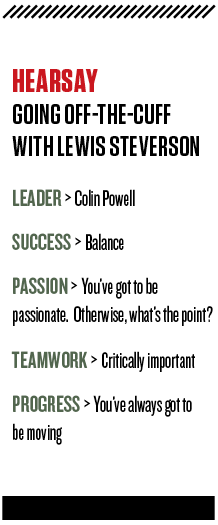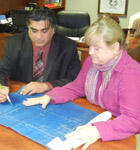 It’s obvious in the way he speaks, confident and controlled, yet entirely approachable: When he sets a goal, Lewis Steverson achieves it.
It’s obvious in the way he speaks, confident and controlled, yet entirely approachable: When he sets a goal, Lewis Steverson achieves it.
His can-do approach started when he was in high school. Although he was a runner on his school’s cross-country and track-and-field teams, he was just 5’1”. He therefore had to work twice as hard as the taller boys to run half as fast. “I’m a disciplined person because I had to be,” says Steverson, now 48, who is senior vice president, general counsel, and secretary to the board at Motorola Solutions, Inc. “I had to develop endurance and strength that made up for the natural abilities I didn’t have.”
To make up for his stature, Steverson spent his summers running 100 miles every week, including five miles every morning and eight every afternoon. When he finally hit a growth spurt—he was 5’9” by his freshman year in college—his times dropped remarkably and he was therefore fast enough to eventually earn a full athletic scholarship in track and field at Siena College in Loudonville, New York. “When you get up at 5 o’clock every morning and force yourself to hammer miles, your personality develops in a certain way,” says Steverson, who still runs four to five miles a day a few times a week. “Most athletes, I think, take the discipline, strength, and rigor that they’ve learned from their sport and continue it in their lives. I’ve been fortunate enough to be able to do that. The discipline and strength of character you need to be a runner have helped me be an effective lawyer.”
The Spin-Off
Indeed, Steverson recently finished one of the most difficult runs of his legal life: In January 2011, he helped Motorola complete a remarkably complicated three-year effort to spin off its mobile-devices business, Motorola Mobility, followed in April 2011 by the sale of the company’s wireless-networks business to Nokia Siemens. “We’ve had a heck of a three-year run here,” Steverson says. “It was like running 100 miles a week again every week for three years as we prepared to separate the company, spin off the mobile-devices business, and sell our wireless-networks business.”
Although the process of spinning off Motorola Mobility began in 2008, Steverson’s path to the position of general counsel began much earlier. The son of New York’s first black state trooper, he originally wanted to be a police officer like his father, with whom he was extremely close. When his dad objected, however—wanting a less dangerous profession for his son—he set his sights instead on a career as a lawyer. “I thought I wanted to be a criminal lawyer,” says Steverson, who graduated in 1991 from Harvard Law School where he was classmates all three years with President Barack Obama. “Law school is very expensive, however, and I came out with an ungodly sum of student-loan debt. So, ultimately I decided to be a commercial litigator instead.”
Steverson did clerkships at several big firms, and joined Arnold & Porter in 1991. In 1995, he was asked to spend six months working with Motorola, one of the firm’s biggest clients, in its Atlanta office. “As an outside commercial litigator, you don’t really get to see the internal workings of a corporation,” he says. “I thought it would be a good opportunity to get to know more about corporate America.”
A six-month residency eventually turned into a full-time position. “When I went to Motorola, my dad [was thrilled],” Steverson chuckles. “He told me, ‘The two pieces of equipment [police officers] rely on the most are our gun and our Motorola.’ He didn’t even call it a radio. He called it a Motorola. The only place better I could have worked in his mind was [with handgun-manufacturer] Smith & Wesson.”
An Uphill Climb
Never content to sit still, his inner runner immediately set off on a 20-year uphill climb to general counsel, which he completed in 16. “My strategy was to move around as much as I could among the various Motorola businesses,” says Steverson, who worked at various points for the legal departments in Motorola’s mobile-devices, broadband, wireless-networks, enterprise, and government-business units. “In my opinion, the best general counsel are the people who come up within the company. I believe you’ve got to grow up in the business to be the best in-business lawyer.”
His strategy worked. When Steverson met Motorola Solutions’ current CEO, Greg Brown, in an elevator at company headquarters in 2005, his reputation had preceded him. “Greg said, ‘You’re Lewis Steverson, aren’t you?’” Steverson recalls. “I said ‘yes,’ and he said, ‘Why aren’t you working for me?’” A week later, he was. And when Brown became CEO in 2008, he made Steverson head lawyer for all but the company’s mobile-devices division, positioning him to become general counsel of Motorola Solutions when that division was spun off in January 2011.
Steverson was in the home stretch of his 20-year plan: Between 2008 and 2011, he helped mediate the legal decisions involved in the spin-off of Motorola Mobility, including what intellectual property it would own, what material litigations would stay and which would go, how much cash the new entity would get, how much debt it would carry, and which entity would own the Motorola brand. “Along with finance and the M&A organization, it was my and my team’s job to determine what should be given to the new entity, and then make recommendations to the CEO,” Steverson says.
Actually, there were two CEOs, as Motorola Mobility had already been given its own leader, Sanjay Jha, prior to its spin-off. “Because we had two CEOs with very different styles, but only one board, legal often got caught in the middle,” Steverson says. “It was dicey, but at the end of the day both CEOs and our board were focused on unlocking value for our shareholders. They made decisions with that goal in mind and we got it done. It was a fantastic—although painful—learning experience.”
Steverson’s first six months as general counsel of Motorola Solutions were equally tumultuous, spent selling Motorola’s
wireless-networks business and resolving a trade secret misappropriation lawsuit that threatened the deal. Today, however, life in the C-suite is more “steady run” than “all-out sprint.”
“What I’m concentrating on now is helping the business run effectively and making sure we’ve got all the appropriate governance in place, doing all the normal things a general counsel would do,” says Steverson, who now leads a legal team of 200 lawyers around the world. “We’ve had a little bit of a breather, but I’m sure things will heat up again soon.” When they do, expect to find him running. “If you’re standing still,” Steverson says, “you’re moving back.”


